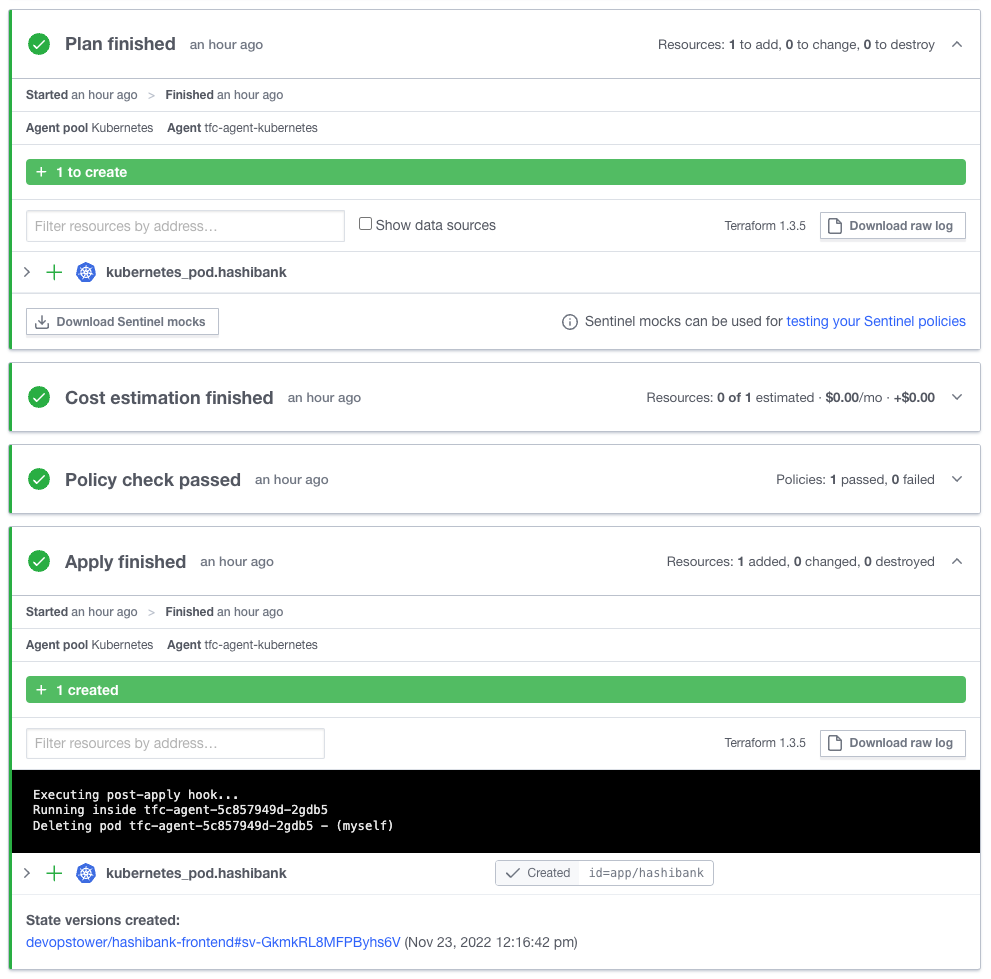This repo deploys a single Vault node, running in -dev mode, onto GKE.
Then it deploys an example web application via Terraform Cloud. The ServiceAccount used by the Terraform Cloud Agent to deploy the web application is generated on-demand via Vault's Kubernetes Secrets Engine.
Although this example was written for GKE, porting this to another distribution of Kubernetes would only require minor changes to the Ingress objects found in deploy/ingress.
- GKE Cluster
kubectlhelmgcloudvault
- Kubernetes namespaces
- Vault ServiceAccount and ClusterRoleBindings
- Vault
- Ingress
- TFC Cloud Agents
- Configure Vault
- Example web app.
Deploy 3 namespaces.
- app - Used by the example web app.
- infra - Used by Vault
- tfc - Used by the Terraform Cloud Agents
sh demo.sh namespacesCreate a ServiceAccount with the cluster-admin permissions. This role is far to permissive for anything other than a demo.
sh demo.sh serviceaccountDeploy a single node of Vault, running in dev mode.
sh demo.sh vault
Deploy Services for HashiBank and Vault. In GKE, we deploy Kubernetes Services of type: LoadBalancer which then provisions a Cloud Loadbalancer mapped to the Service.
sh demo.sh ingressThis step requires that you already have a Terraform Cloud Agent token exported as an environment variable. This guide won't go into the detail of configuring Terraform Cloud or Agents, however, here is a link to the official documentation on setting up Agents.
In this example, we deploy a Terraform Cloud agent where the image has been customized to include a Post-apply hook that deletes the Pod once it's finished the Terraform Apply.
The reason why we delete the Pod is to invalidate the Kubernetes MountedServiceAccount token that the Pod had access to. This means that if anyone exfiltrated the token from the MountedServiceAccount, it would only be valid for a short amount of time. Still need more detail?
export TFC_AGENT_TOKEN=<insert-your-agent-token-here>
sh demo.sh tfc-agentexport VAULT_ADDR="http://$(kubectl -n infra get svc vault-external -o json | jq -r '.status.loadBalancer.ingress[0].ip')"
export VAULT_TOKEN=root
export CLUSTER_ZONE=australia-southeast1
export CLUSTER_NAME=my-cluster
export VAULT_SA_NAME=$(kubectl -n infra get sa vault-cluster-admin -o jsonpath="{.secrets[*]['name']}")
export SA_JWT_TOKEN=$(kubectl -n infra get secret $VAULT_SA_NAME -o jsonpath="{.data.token}" | base64 --decode; echo)
export SA_CA_CRT=$(kubectl -n infra get secret $VAULT_SA_NAME -o jsonpath="{.data['ca\.crt']}" | base64 --decode; echo)
export K8S_HOST="https://$(gcloud container clusters describe ${CLUSTER_NAME} --zone ${CLUSTER_ZONE} --format json | jq -r .endpoint)"
vault auth enable kubernetes
vault write auth/kubernetes/config \
token_reviewer_jwt="$SA_JWT_TOKEN" \
kubernetes_host="$K8S_HOST" \
kubernetes_ca_cert="$SA_CA_CRT"
vault write auth/kubernetes/role/tfc \
bound_service_account_names=tfc-agent \
bound_service_account_namespaces='tfc' \
policies=tfc \
ttl=1h
vault policy write tfc - << EOF
path "auth/token/create" {
capabilities = ["update"]
}
path "kubernetes/creds/generated-role" {
capabilities = ["create", "update"]
}
EOFTo confirm that the Kubernetes authentication method is working, run the following commands from inside the Terraform Cloud Agent. A successful configuration will result in a Vault token being issued.
export SA_TOKEN=$(cat /var/run/secrets/kubernetes.io/serviceaccount/token)
export VAULT_TOKEN=$(curl \
--request POST \
--data '{"jwt": "'"$SA_TOKEN"'", "role": "tfc"}' \
http://vault.infra.svc:8200/v1/auth/kubernetes/login| jq -r .auth.client_token)
echo $VAULT_TOKENConfigure the Kubernetes Secrets Engine and create the policy for the tfc agent.
sh demo.sh vault-configValidate
vault write kubernetes/creds/cicd-write kubernetes_namespace=app
WARNING! The following warnings were returned from Vault:
* the created Kubernetes service accout token TTL 48h0m0s is less than the
Vault lease TTL 768h0m0s; capping the lease TTL accordingly
Key Value
--- -----
lease_id kubernetes/creds/cicd-write/mZa7qLxsYMqStSROhgNUMjSQ
lease_duration 48h
lease_renewable false
service_account_name v-token-cicd-wri-1669166018-pskgvgsgdiou7ohmzmg6fu3e
service_account_namespace app
service_account_token eyJhbGciOiJSUzI1NiIsImt.....
kubectl get serviceaccount -n app
NAME SECRETS AGE
default 1 61m
v-token-cicd-wri-1669166018-pskgvgsgdiou7ohmzmg6fu3e 1 6sCreate a Terraform Cloud workspace with the following config.
- VCS driven workspace
- path set to
deploy/hashibank - Agent pool set to the agent configure in Step 5
Now you should have deployed the HashiBank app into the app namespace.
kubectl get pods -n app
NAME READY STATUS RESTARTS AGE
hashibank 1/1 Running 0 72mBrowsing to your HashiBank ingress IP address will show the following webpage.

Still not sure why we delete the tfc-agent pod after its executed our Terraform Cloud run? A more detailed explanation is available here.
cd build/tfc-agent
docker build -t jamiewri/tfc-agent-kubernetes:1.4 .
docker push jamiewri/tfc-agent-kubernetes:1.4
Revoke all leases for the mount
vault lease revoke \
-prefix kubernetesRevoke all leases for role
vault lease revoke \
-prefix kubernetes/creds/cicd-write
